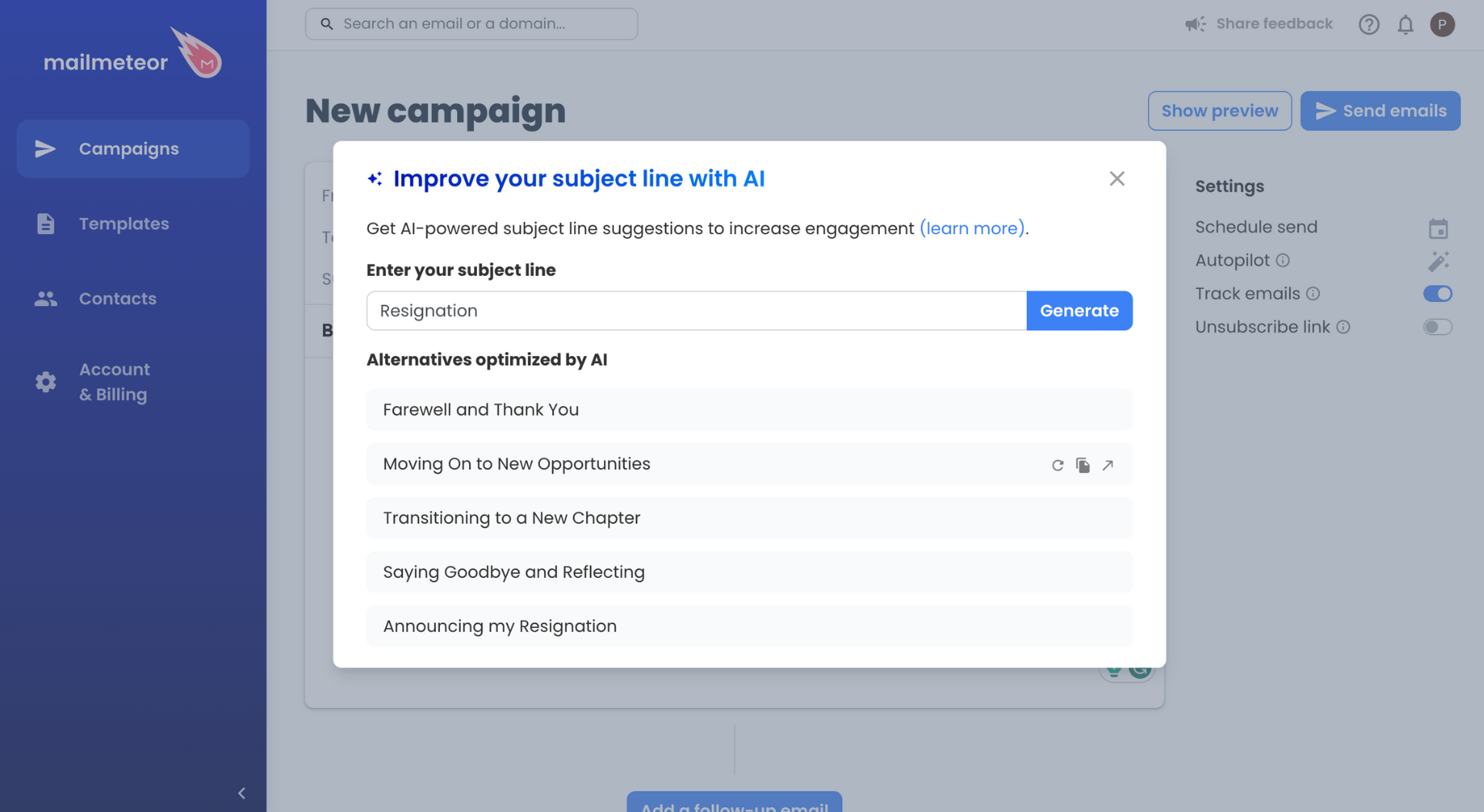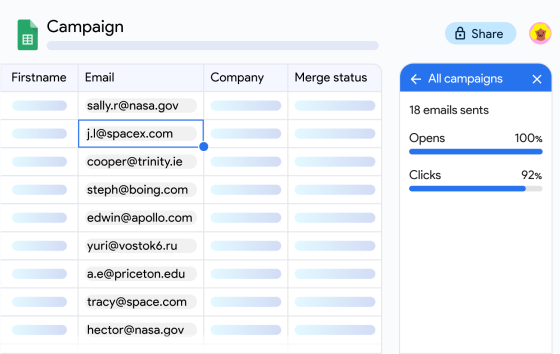Quitting your job is never easy. And if you don’t do it right, you can end up missing out on valuable business opportunities. In this quick guide, we’ll show you how to write the perfect resignation email. So that you can leave your company peacefully, and stay on good terms with your employer.
Want to relinquish your current position? In most cases, it’s considered best practice to inform your boss about your resignation in a face-to-face conversation, as a sign of respect and professionalism.
However, some situations can make it challenging or impractical to do so. When that happens, written communication can be used as an alternative, and you can write a formal letter, or send a resignation email.
Wondering if resigning over email is a good idea? In today’s guide, we’ll cover everything you need to know about resignation emails and how to write them, including:
- What is a resignation email?
- Why send a notice of resignation by email?
- How to write an email resignation letter?
- 3 resignation email templates
Sounds good? Then let’s dive right in ⤵️
What is a resignation email?
A resignation email, also known as a resignation letter or notice of resignation, is a written communication that an employee sends to their supervisor to inform them of their intention to resign from their current position.
It’s a formal way of notifying your employer about your decision to leave the company. Ideally, your resignation email should include a clear subject line, maintain a professional tone, and specify your last day of work.
Why send a notice of resignation by email?
Your email of resignation is a critical step in the process of departing from your job. It serves as an official record of your intent to resign and helps make the transition smoother for both you and your employer.
In most cases, it’s better to inform your supervisor over a face-to-face conversation or a video chat. This allows you to convey the right tone, leave on good terms, and maybe even receive an interesting counteroffer.
But in some situations, it might be in your best interest to resign over email. Here are a few reasons why you should consider sending your notice of resignation by email instead of asking for a 1-on-1 conversation with your boss ⤵️
- Official record – Your resignation email serves as a written record of your intent to leave the company, which can be referred back to in case of any disputes or misunderstandings with your employer.
- Company policy – Most companies have specific protocols to handle resignations, and their policy often requires you to send a written notice of resignation.
- Polite communication – If you’re working remotely, or if things are a bit tense with your supervisor, writing a resignation email might be the best way to maintain communication.
Sending a resignation email will help you maintain good relationships and a positive reputation in your professional network. As long as you know how to find the right words. Which brings us to the next section.
How to write an email resignation letter
Composing a professional resignation email letter can be a challenging task. Especially if you’re uncertain about where to begin and what details to include in your notice of resignation. So let’s break down the entire process, shall we?
1. Use a clear resignation email subject line
You want to make sure your supervisor will open your email. So there’s no need to try to be clever here.
Pick a very simple subject line and make sure to include the word Resignation. This will 100% catch your employer’s attention.
You can also include your full name or your date of departure in your resignation email subject line if you want.
Just try to keep your subject line under 50 characters. Any more than that and it may be truncated on mobile devices.
Here are a few examples of subject lines that you can use to start writing your salary negotiation email:
- Leaving [Company]
- Departure - [Your Name]
- Resignation - [Your Name]
- Formal Notice - [Your Name]
- Change of Role - [Your Name]
- Resignation Notice - [Your Name]
- [Your Name] - Letter of Resignation
Need more inspiration? Try our free subject line tester and get AI-powered suggestions to improve your email subject.

2. Start with a professional greeting
Your resignation email should sound polite and professional. And the best way to do that is to start with a formal greeting.
When addressing your supervisor, you can either use a formal salutation such as Dear Mr. Smith, or something a bit more friendly like Hi John,.
At any rate, the best greeting will depend on the nature of your relationship with your recipient. So try to pick what feels the most natural.
You can also add an opening sentence such as I hope this email finds you well to give your message a positive tone.
3. Specify your last day of work
Most employers require at least two weeks’ notice before leaving your job. So take some time to check your company’s policy. If possible, you want to play by the rules and respect your employer’s resignation protocol.
If for some reason you can’t give your employer the standard two weeks’ notice, try to notify them as early as you can. This is common courtesy and they need this time to find your replacement.
In your resignation email, make sure to be very clear about your last day of employment to avoid any confusion. For example, you can say: I’m writing to resign from my position as [Your Job Title], effective [Last Working Day].
4. Be positive
Quitting your job is kind of like ending a dating relationship. Ideally, you want to leave the company on a positive note, maintain friendly relations with your employer, and avoid burning any bridges.
Who knows? You might need a recommendation at some point. Or they may know other people in your industry that can make or break your career. So make sure to leave a positive impression.
The best way to do that is to end your resignation email with a few lines to express your gratitude. Share what you’ve enjoyed about working with the company. Or thank your employer for your experience with them.
For example, you could say something like: I want to express my deep gratitude for the opportunities I’ve had at [Company Name] and your support during my time here. It’s been a real pleasure working with you.
Don’t complain. Even if you hated working for this company. Criticizing your boss or colleagues may feel good for a moment. But you’ll probably end up regretting it later on. So stay positive. Soon you’ll be free anyway.
5. Offer to help
Leaving your job will impact your company. As well as your team members. So it might be a good idea to acknowledge this in your email and offer your help to minimize disruption during this transition.
In your resignation email, make sure to show your goodwill by assuring your supervisor that you’re available to provide guidance, hand over your ongoing projects, or even train a colleague to take over your responsibilities.
For example, you could write: I understand the challenges this may pose for the team, and I am committed to assisting in any way possible to minimize disruption during this transition. Please let me know if there’s anything I can do to help.
You want to show your employer that just because you’re leaving your job, this doesn’t mean you no longer care about the company and its success. This will make your whole resignation process much smoother.
6. Proofread your email
Last but not least, make sure to triple-check your resignation email to make sure it’s free of any spelling or grammar mistakes.
You want to look professional, as this is your last chance to make a good impression and leave the company on a positive note.
You can ask for a friend or a family member to proofread your email before sending it. Or you can use a free spell checker, like Grammarly.
Don’t just look for spelling errors. Proofreading your email is also a good way to make sure that you’ve used the right tone.
Resigning from a job can create some tension, especially if you don’t get along well with your supervisor.
But even if your boss was a jerk to you, it’s important to remain courteous. Maintaining a professional tone can prevent the conflict from escalating.
3 resignation email templates
By now, you should know a thing or two about how to write a professional resignation email. But if you’re still struggling to find the right words, here are 3 handy templates you can use to inform your supervisor that you want to quit your job. Choose the best resignation email template and fill in the blanks.
Short and Sweet Resignation Email
Dear [Supervisor’s Name],
I’m writing to resign from my position as [Your Job Title] at [Company Name]. My last working day will be [date]. I appreciate the opportunities I’ve had here, and I’m excited to explore new challenges in my career.
Over the next two weeks, I will do everything possible to complete my tasks and train other team members if needed. Please let me know if there is anything else I can do to ease the transition.
Thank you for your support.
Best regards,
[Your Name]
Immediate Resignation Email
Dear [Supervisor’s Name],
I regret to inform you that I must resign from my position as [Your Job Title] at [Company Name] effective immediately due to [briefly explain the reason for your immediate departure].
I want to assure you that this decision was not made lightly. I understand that this may put the team in a difficult position, and I’m willing to assist in any way I can to ease the transition.
Thank you for your understanding.
Sincerely,
[Your Name]
Career Opportunity Resignation Email
Dear [Supervisor’s Name],
I am excited to inform you that I have been presented with a new career opportunity that I cannot pass up. Consequently, I must resign from my role as [Your Job Title] at [Company Name].
My last working day will be [date]. I appreciate all the support and opportunities I’ve received at [Company Name], and I look forward to staying connected. Please let me know if there’s anything I can do to ease the transition.
Best wishes,
[Your Name]
Frequently Asked Questions
Is it OK to resign over email?
If possible, you should resign in person. This looks more professional. Book a private meeting with your supervisor and let them know about your resignation.
However, this is not always an option. If your supervisor is working remotely, or if he’s based in another city or country, you’ll need to find another way to resign.
In this case, you have 3 options. You can either pick up your phone, schedule a video meeting, or send a resignation email.
This last alternative feels less personal. But if things are tense with your manager, or if you can’t grab a hold of them, this is your best option.
It is perfectly OK to resign over email. As long as you make sure to write a professional and polite email resignation letter.
How to resign from a job professionally?
Resigning from your job is a critical step in your career. If possible, you want to maintain a good reputation and avoid burning any bridges. So make sure to handle this process with tact and consideration.
To resign from your job professionally:
- Review your employment contract – Check your offer letter to see if you have to respect a specific notice period, or if any other requirements need to be met before you can resign from your current position.
- Schedule a meeting – Request a 1-to-1 meeting with your manager to inform them about your plans. If possible, try to meet them in person. But if that’s not an option, you can schedule a video call.
- Prepare a resignation letter – Write a concise, formal, and professional resignation letter. Make sure to specify your last day of work, express your gratitude, and offer to assist with the transition.
- Notify HR – After meeting with your manager, make sure to inform your company’s HR department of your resignation. They will help you with the formalities, and work on finding your replacement.
- Say goodbye – Lastly, inform your colleagues and express your appreciation for working with them. On your last day, make sure to clean up your workspace, return the company’s property, and say your goodbyes.
How do you end a resignation email?
The ending of your resignation email is important. This is the last thing your recipient will read. So make sure to get it right. To conclude an email resignation letter, you need 3 things:
- A closing line – Try to end on a positive note. This is a great place to express your gratitude and show your appreciation.
- A professional email sign-off – You can stick with something like “Kind regards”, “Best”, or “Sincerely”. No need to get fancy.
- Your email signature – Add your name, first name, and coordinates. To let your recipient know how they can contact you.



